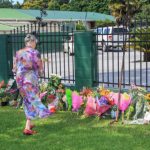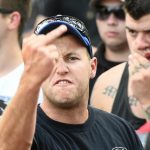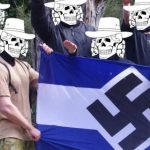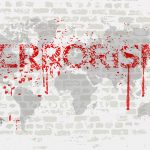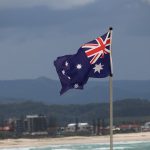Coalition Refuses to Act Against the Threat of Far-Right Extremism
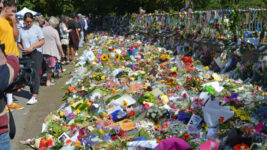
Images capturing a group of Anglo Australian men with their shirts off standing before a burning cross in the Victorian Grampians in late January 2021 make it increasingly hard to dismiss far-right groups as simply ineffectual suburban youths with too much time and hate on their hands.
Instances of white supremacist groups making an impact on mainstream Australian public discourse have been increasing over the last half decade, and the damage that these entities can cause was displayed when one of the so-called patriots took out his rage upon the innocent in Christchurch.
Reclaim Australia was the first such group to organise in 2015. Others soon followed, including splinter group the United Patriots Front.
And the group photographed in the Grampians going by the name the National Socialist Network reveals renewed organising, as it involved the merging of the Lad’s Society and the Antipodean Resistance.
ASIO boss Mike Burgess said in October that his agency is now focusing around 30 to 40 percent of its surveillance activities upon the “evolving threat” posed by “extreme right-wing individuals”.
And the attack upon an Aboriginal woman in Perth last Saturday, which involved a white man with a swastika painted on his forehead, is yet another sign that far-right extremists are on the rise, and, as with Christchurch, this can entail lone actors.
Last week’s incident has renewed calls for the Morrison government to take action. However, the Coalition has long been known to simply let the situation fester.
The far-right ecosystem
“There’s reasons for the Australian government to be concerned about far-right extremism,” said Deakin University Global Islamic Politics Professor Greg Barton. “Partly, that is because of far-right groups. But the problem is not limited to them.”
“If we look at the size of the established organisations, they’re not that large. For the most part, they don’t appear to be that well organised,” he told Sydney Criminal Lawyers.
“So, it’s easy to say they’re just a rough rabble. If they get out of line, they’re a problem – but so far, so good.”
However, while downplaying of the threat white supremacists pose may have been feasible once, the Christchurch mosque massacre has revealed that lone actors can be radicalised by the far-right network in Australia and then go on to perpetrate obscene crimes on their own.
According to Barton, the white Australian Christchurch killer – who grew up in the NSW town of Grafton – had posted messages praising the United Patriots Front online, and while the connection to the broader far-right extremist “ecosystem” was there, he wasn’t acting on behalf of any group.
“There are strong grounds for making a case for having some of these groups proscribed and listed,” Professor Barton continued. But he warned that this approach won’t ensure the threat the rising right now constitutes will simply go away once this “legislative hammer” is applied.
They’re alright by us
Labor home affairs spokesperson Kristina Keneally has long been pushing for far-right groups to be listed as proscribed terrorist organisations. She’s noted that Australia is the only Five Eyes nation not to have taken the step.
The Morrison government, however, continues to dismiss her proposal.
In the wake of the Grampians incident, Labor moved a Senate motion warning of the rise in far-right extremism. But the government watered it down, so the motion conflated the far-right with “far-left” extremism, despite the fact there’s no evidence of any extremist left-wing threat.
The government also scrubbed out a section of the motion, which criticised its MPs George Christensen and Craig Kelly for promoting conspiracy theories associated with the right.
Indeed, the Coalition has long been criticised for permitting members of parliament to spout racist right-wing opinions going back as far as the Howard era.
One Nation’s Pauline Hanson was permitted to stand as a lower house MP in the mid-1990s and propagate anti-Asian rhetoric and racist ideas about First Nations peoples. The far-right politician then proceeded to attack Muslims in 2016, when she gave her maiden speech in the Senate.
Hanson and Liberal Nationals member Christensen both attended Reclaim Australia rallies in the group’s early days.
While in a rare moment of expressing true colours, all Coalition senators voted in support of a Hanson motion proclaiming that “It’s okay to be white” in October 2018. Following outrage, the members revoked their votes claiming they were unaware of the racist undertones.
It’s okay to be far-right
“We have a government that around the edges is being weighed down by right-wing extremist elements within the Liberal Party and the National Party,” Professor Barton made clear. “This is the inconvenient truth.”
Due to these internal elements the Morrison government doesn’t want to crack down on the far-right groups in the suburbs for “fear of blowback”, the academic explained. And this is the same for individuals like Hanson on the crossbench, as the Coalition needs their support in the Senate.
“It’s clearly the case that we have a more right of centre, conservative Coalition government than we’ve had historically,” Barton further clarified. “It’s perhaps the most conservative cum reactionary government we’ve ever had.”
The professor said this was particularly evidenced in the Morrison government’s attentiveness to the Trump administration.
The mobilisation of far-right elements in the Grampians under the banner of the National Socialist Network was sparked by the storming of Washington’s Capitol Building in January by white supremacist supporters of outgoing president Donald Trump.
A far-right mobilisation of this scale in the States was likely to spark action in this country, as the professor explains these ultranationalists consist of loosely linked groupings that connect online.
Concealing allegiance
Home Affairs minister Peter Dutton begrudgingly permitted a Labor-backed parliamentary inquiry into extremist movements and radicalism to go ahead last December. But that was only after he insisted it should investigate Islamic extremists, along with the white nationalists.
The issues around the Coalition’s inability or straight out refusal to condemn or take action against the rising far-right reached the absurd, as the professor pointed out, when last year Dutton declared that Islamic extremists were actually left-wing terrorists.
“Here is one of the most senior figures in the government, not being able to call things as they really are due to his own personal convictions,” Barton said, adding that other ministers were reluctant to criticise the far-right “partially out of conviction”, “political calculations” or “cynical pragmatism”.


